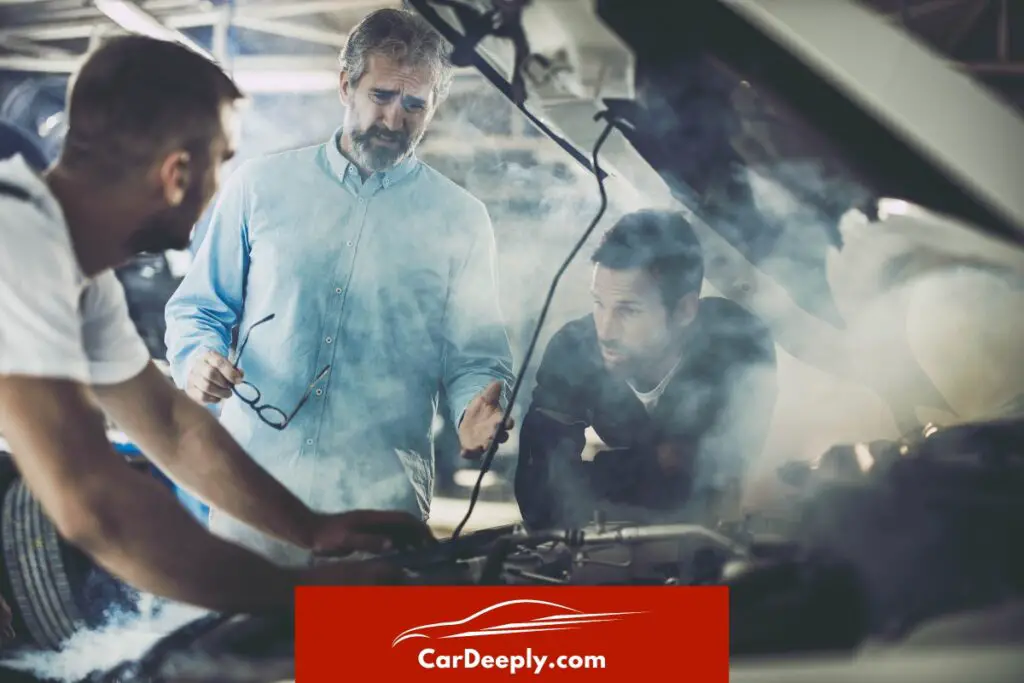Overheating can turn a pleasant drive into a roadside breakdown nightmare. This guide will arm you with the knowledge to prevent such a scenario.
We’ve gathered expert insights and practical advice to help you understand why your car might be overheating.
By the end of this article, you’ll be equipped with:
- An understanding of the common causes of overheating.
- Practical tips to prevent your car from overheating.
- Steps to take if your vehicle starts to overheat.
Refrain from overheating issues catching you off guard. Dive in to keep your car running cool and your journeys uninterrupted.
Advertising links are marked with *. We receive a small commission on sales, nothing changes for you.
Key Takeaways

- Overheating can cause severe engine damage.
- The cooling system, including the radiator, thermostat, and water pump, prevents overheating.
- Regular maintenance, including coolant changes and radiator flushes, can prevent overheating.
- Addressing signs of overheating promptly can prevent costly repairs.
- If your car starts to overheat, it’s best to pull over and let it cool down.
Understanding Your Car’s Cooling System Components
To fully grasp the importance of each part in preventing your car from overheating, let’s take a closer look at the key components of the cooling system and its functions:
Component | Role | Symptoms of Malfunction |
|---|---|---|
Radiator | Dissipates heat from the coolant | Leaks, overheating |
Thermostat | Controls the coolant flow | Overheating, engine running too cool |
Water Pump | Propels the coolant | Leaks, overheating, whining noise |
Coolant | Transfers heat from the engine | Low coolant level, overheating |
Hoses | Facilitate coolant movement | Leaks, overheating |
What Does It Mean When Your Car Overheats?
When we say a car is overheating, we refer to the engine’s temperature rising beyond its normal range.
This can be a serious issue.
If not addressed promptly, overheating can cause significant damage to your engine, leading to costly repairs or even a complete engine replacement.
The Importance of Addressing Overheating Issues
Ignoring signs of overheating can lead to disastrous consequences.
When an engine overheats, it can warp and damage internal components, leading to a breakdown.
In severe cases, it can even lead to a fire. Addressing overheating issues promptly saves you from these dangers and helps maintain your car’s performance and longevity.
Engine Heat and Cooling System Basics
Your car’s engine produces a lot of heat while running. This heat is managed by the cooling system, which circulates coolant (also known as antifreeze) around the engine block, absorbing heat and dissipating it through the radiator.
The cooling system consists of several components, including the radiator, thermostat, water pump, coolant, and a network of hoses.
Each of these components plays a crucial role in preventing your car from overheating:
- Radiator: It cools the hot coolant from the engine before circulating back.
- Thermostat: It regulates the coolant flow based on the engine’s temperature.
- Water Pump: It circulates the coolant through the engine and the radiator.
- Coolant: It absorbs heat from the engine and carries it to the radiator.
- Hoses: They transport coolant between the engine, radiator, and the rest of the cooling system.
Understanding these basics is the first step toward diagnosing and fixing overheating issues. In the next part, we’ll delve into the common causes of car overheating and how to address them.
Causes and Solutions for Car Overheating
Thermostat Failure: Causes and Solutions
The thermostat is a small device that regulates the coolant flow based on the engine’s temperature. It can get stuck in the closed position when it fails, preventing coolant from reaching the engine.
This leads to overheating.
To fix a faulty thermostat, you’ll need to replace it.
Here’s a simplified process:
- Locate the thermostat. It’s usually found where the top radiator hose connects to the engine.
- Remove the radiator hose and the bolts holding the thermostat housing.
- Replace the old thermostat with a new one and reassemble everything.
Always consult your vehicle’s manual or a professional mechanic when performing repairs.
Coolant Leak: Causes and Solutions
Coolant leaks are a common cause of overheating. They can occur in the radiator, water pump, or any of the hoses in the cooling system.
To fix a coolant leak:
- Identify the source of the leak. Look for puddles of coolant under your car or coolant traces on the hoses or other parts of the cooling system.
- Depending on the source, you may need to replace a hose, the radiator, or the water pump.
Again, seek professional help if you’re uncomfortable doing this yourself.
Fan Problems: Causes and Solutions
The fan helps cool the radiator. If it’s not working properly, the radiator won’t be able to dissipate heat effectively, leading to overheating.
To fix a faulty fan:
- Check the fan fuse and replace it if it’s blown.
- If the fuse is fine, the fan motor might be the problem. In this case, you’ll need to replace the fan.
Blocked Coolant Hoses and Contaminated Coolant: Causes and Solutions
Blocked or contaminated coolant can also cause overheating. Regular coolant changes can prevent this issue.
To change your coolant:
- Drain the old coolant from the radiator.
- Refill with fresh coolant, following the manufacturer’s instructions.
Radiator Issues: Causes and Solutions
Radiator issues, such as blockages or leaks, can lead to overheating. Regular radiator flushes can help prevent blockages.
To flush your radiator:
- Drain the old coolant.
- Fill the radiator with a radiator flush product and water.
- Run the engine for the time specified on the flush product.
- Drain the radiator again and refill it with fresh coolant.
Faulty Water Pump: Causes and Solutions
The water pump circulates coolant through the engine. If it fails, the coolant won’t circulate, leading to overheating.
Fixing a faulty water pump usually involves replacing it, which is a job best left to professionals due to its complexity.
Conclusion: Preventive Measures and Regular Maintenance
Preventing your car from overheating involves regular maintenance, including coolant changes, radiator flushes, and checking the cooling system for leaks or blockages.
By understanding the causes of overheating and how to address them, you can keep your car running cool and avoid costly repairs.
FAQs
What are the signs of a failing water pump?
A failing water pump can cause coolant leaks, overheating, a whining noise from the front of your car, or steam coming from your radiator. It’s crucial to address these signs promptly to avoid severe engine damage.
How often should I change my coolant?
Most manufacturers recommend changing your coolant every 30,000 to 60,000 miles, but it can vary depending on your vehicle and driving conditions. Always refer to your vehicle’s manual for specific recommendations.
Can I drive my car if it’s overheating?
It’s not advisable to drive an overheating car. Doing so can cause severe engine damage. If your vehicle starts to overheat, it’s best to pull over and let it cool down.
What type of coolant should I use for my car?
The type of coolant you should use depends on your vehicle’s make and model. Always refer to your vehicle’s manual for the recommended type of coolant.
Can a bad thermostat cause a car to overheat?
Yes, a bad thermostat can cause a car to overheat. If the thermostat is stuck in the closed position, it can prevent coolant from circulating, leading to overheating.

Sebastian loves convertibles and drove a BMW 335i for a long time (325 hp is just a dream). Today, with two children, he is more concerned with SUVs and family-friendly vehicles. In addition to an Audi A4 Avant, he also drives a Cupra Formentor VZ – even as a family man, you can’t do without speed. Get to know Sebastian better and visit the About Us page.
Advertising links are marked with *. We receive a small commission on sales, nothing changes for you.
